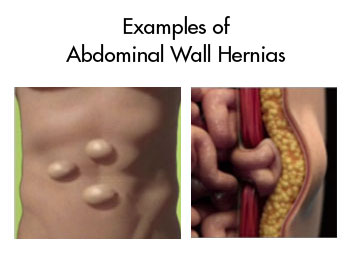An abdominal hernia occurs when tissue or part of an internal organ bulges through a weak spot or hole in the muscle. Most hernias occur in the abdomen and may occur due to previous surgeries, childbirth, or trauma. Hernias can also be congenital.
Symptoms of Abdominal Hernias
Abdominal hernias may cause discomfort, pain, and/or a bulge or swelling in the area of the hernia. These symptoms may be more noticeable when sneezing, coughing, lifting, or during activities causing exertion. Some hernias—called hiatal hernias—are caused by a weakness or opening in the diaphragm and cause acid reflux.
Hernia Treatment
A hernia will not go away on its own. If left untreated, a hernia will slowly enlarge and worsen over time, causing more pain and discomfort. Hernia surgery is currently the only method for treatment and repair of a hernia. A hernia should be addressed at the first signs of onset. Early treatment will help ensure a shorter recovery and decrease the chance that the hernia will reoccur.
Surgery to repair an abdominal hernia is one of the most common surgical procedures performed in the United States. The surgeons at Nicholson Clinic have performed thousands of hernia repairs with successful outcomes.
For more information concerning Hernias, please visit Abdominal Surgery Specialists.
Patient Journey
Watch this video series following a recent patient as she undergoes hernia repair surgery. Meet Jillyn and see what the day of surgery looks like, followed by her recovery progress 24 hours later, and two-weeks post-op.













